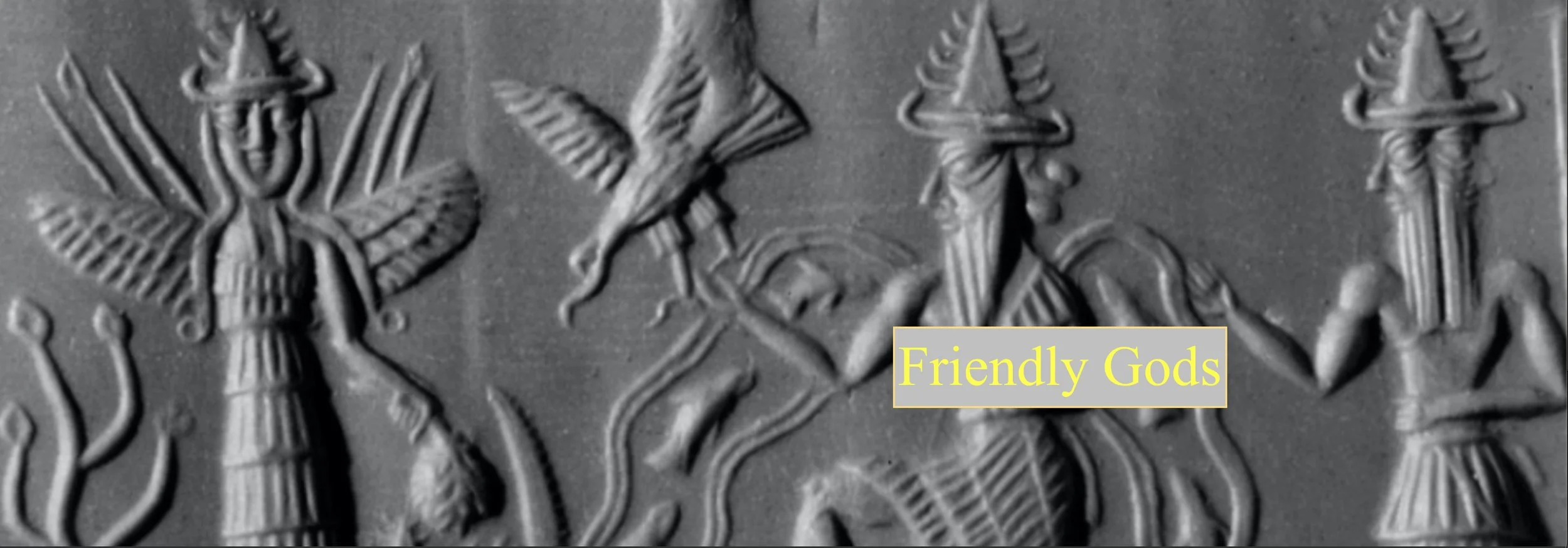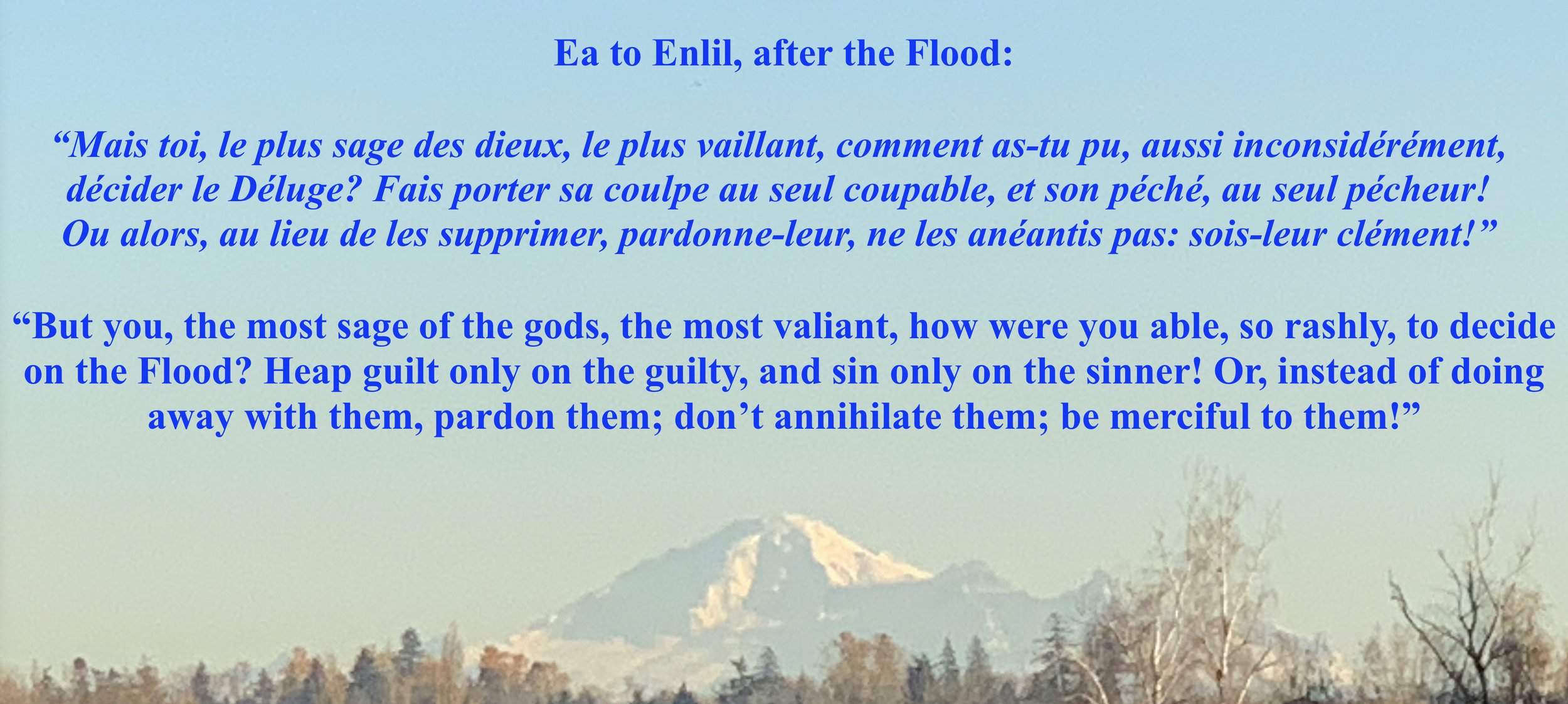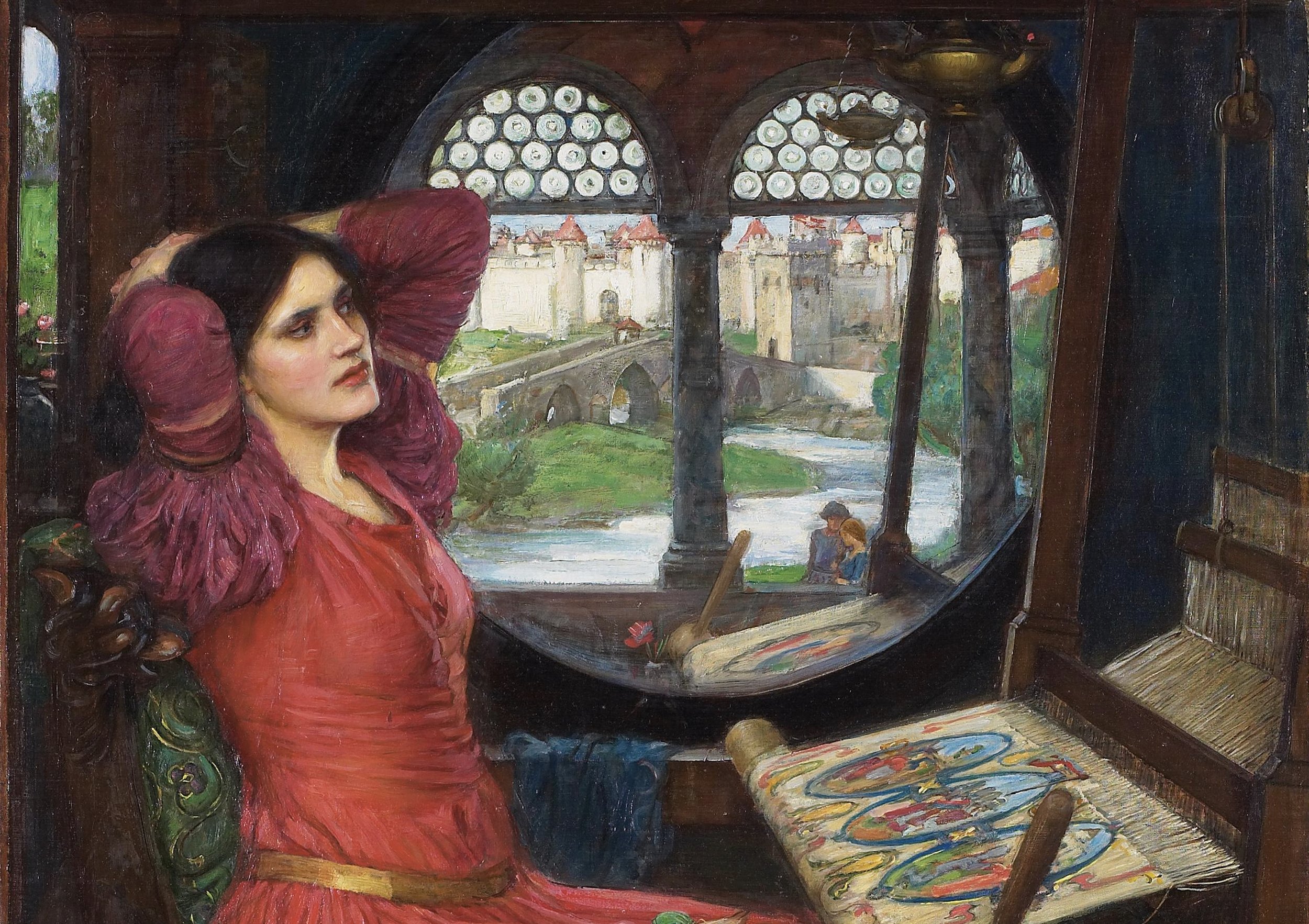Gospel & Universe ♒️ The Currents of Sumer
Friendly Gods
Shamash, Ea, & Enkidu - Siduri & Ecclesiastes - As Flies to Wanton Gods?
♒️
♒️
Shamash, Ea, & Enkidu
Another possible connection between the Bible and Mesopotamian texts is that both have compassionate or merciful aspects. The gods Utu/Shamash and Enki/Ea seem to have something of Yahweh’s mercy and Christ’s compassion (Utu and Enki are their Sumerian names; Ea and Shamash are their later Akkadian names). I’m not saying that a strong case can be made for these particular connections, but I’d like to use them as an opportunity to touch on some of the compassionate qualities of Mesopotamian religion, which has often been seen as brutal and primitive by Jewish and Christian writers. I’d also like to suggest that the existential problem in Gilgamesh finds a solution of sorts in the Christian notion of the afterlife.
First off, we find in Shamash, the sun god of justice, the same sort of pro-human sentiments we find in Ea, the god of sweet or fresh water. It’s Shamash who helps Gilgamesh and Enkidu defeat Humbaba, who controls the abode of the gods. Shamash may not be an iconoclastic rebel like Prometheus, yet he does seem to have a problem with the stern, and frankly unjust Enlil — the high god who floods the Earth because humans were too noisy. Shamash is, after all, pre-occupied with justice, as we see in his placement above the 18th century BC Code of Hammurabi (which I’ve put next to Shamash in a libation scene from the late 3rd millennium BC, both now in the Louvre):
In the following translation of the scene from Gilgamesh in which Shamash helps Gilgamesh, the words may appear more Christian-sounding than they might be in another translation, yet the direction of Shamash’s sentiment — toward humans and against Humbaba (who protects Enlil’s abode) — is clear:
Gilgamesh said [to Enkidu], “I had another dream. We were in a deep gorge of the mountain. Next to the mountain we were like mosquitoes. Suddenly the mountain fell on us. Then there was a terrible light, and in it was one [Shamash] whose grace and beauty are greater than the beauty of the world. He pulled me out from under the mountain, and gave me water to drink. My heart was comforted as he set my feet on the ground.”
Like Shamash, Ea seems to be particularly fond of humans — and thus he appears more like the human Christ than the more distant Yahweh, who can be merciful yet is famous for his anger and jealousy. It’s Ea who, against the plan of Enlil, whispers to Utnapishtim that Enlil is going to flood the world, so he should build an ark. If we can see the sternness of Yahweh as related to the sternness of Enlil, perhaps the ideas of mercy and forgiveness are also related.
(I explore this tension between power and grace on the final page of this chapter, The Return of Enlil, where I look at the present potentially apocalyptic situation in Ukraine in terms of the angry god Enlil and the human-friendly god Ea.)
The crisis in Gilgamesh’s life comes when Enkidu dies as a result of insulting the goddess Ishtar. The way Gilgamesh deals with the death of his dear friend (and perhaps lover) is relevant to the historical shift from no afterlife in the Ancient World to an afterlife in the Classical Age. In the epic, Gilgamesh is bereft after Enkidu dies. He despairs, goes almost mad, and makes a journey to Utnapishtim to see if he can find some way to reach his friend in the the afterlife. Utnapishtim tells Gilgamesh that while he gets to live eternally, no one else gets eternal life.
Drawing from Andrew George’s The Babylonian Gilgamesh Epic: Introduction, Critical Edition and Cuneiform Texts (2003), Wikipedia has the following in its entry “Shamash”:
According to a tablet presumed to originate in Sippar [a city which held Shamash as the high god], Gilgamesh later encounters Shamash while wandering in the steppe mourning Enkidu's death. The sun god warns him about the futility of the quest for eternal life. This passage is not present in any later versions, but Shamash's advice closely parallels another unique scene from the same version, namely the advice given by the anonymous alewife who corresponds to Šiduri from the Standard Babylonian version.
From an agnostic point of view, the Gilgamesh story puts an ancient stress on the sad possibility that there is no way out. The deep dark mythical past saw only two people survive the wrath of the the high god Enlil.
As the above quote notes, this point is also made by the ale-wife Gilgamesh meets earlier when he is far from Uruk on his quest. Siduri tells him to stop searching for that which he can never have. She urges him to forget all that idealistic fantasizing and to instead start taking care of the things in life that can give him happiness, such as his wife and children. In other (Latin) words: carpe diem, seize the day.
I am half-sick of shadows, said the Lady of Shalott.
♒️
Siduri & Ecclesiastes
Further down this page I quote Bottéro’s translation of what Siduri says to Gilgamesh, who is wandering at the ends of the earth, searching for a way to join his dead friend Enkidu. Bottéro notes that 1. Siduri’s name later connects her to Ishtar, 2. “she belongs to the supernatural world, since her name is preceded in cuneiform by the sign indicating divinities” (elle appartient au monde surnaturel, puisque son nom est précédé, en cunéiforme, du signe indicatif de <<divinités>>), and 3. Siduri is an early version or “model, projected in legend, of those merchants of the crossroads, even if one sees poorly, here, at the end of the world, who might be her clients” (Siduri est le modèle, projeté dans le légende, de ces <<commerçantes de carrefour>>, même si l’on voit mal, ici, au bout du monde, quels pouvaient être ses clients).
Siduri brings up many interesting possibilities, especially because of her similarity to later wise and prophetic figures like Tiresias and Circe. Like Circe, Siduri gives the hero counsel and also directs him to the world of the afterlife. One might also recall that one of the most famous Mesopotamian stories is about the descent of Ishtar (or Inanna) to the grim afterlife — perhaps the first of many such epic visits... The speculative possibilities are endless, yet also endlessly clouded by layers of time, so I’ll return to Bottéro’s translation of Siduri’s words to Gilgamesh, as well as to his view that there’s a deep (yet murky) link between these words and the words in Ecclesiastes:
«Que vagabondes-tu ainsi, Gilgamesh ? / La vie sans fin que tu recherches, / Tu ne la trouveras jamais! / Quand les dieux ont créé les hommes, / Ils leur ont assigné la mort, / Se réservant l'immortalité, à eux seuls ! / Toi, plutôt, remplis-toi la panse ; / Demeure en gaieté, jour et nuit ; / Fais quotidiennement la fête ; / Danse et amuse-toi, jour et nuit ; / Accoutre-toi d'habits bien propres ; / Lave-toi, baigne-toi ; / Regarde tendrement ton petit / Qui te tient la main ; / Et fais le bonheur de ta femme / Serrée contre toi: / Car telle est / L’unique perspective des hommes ! »
“Why do you roam thus, Gilgamesh? / The eternal life you search for / You will never find! / When the gods created men / They allotted them death, / Reserving immortality for themselves only! / So therefore fill your belly, / Live in happiness day and night; / Celebrate every day, / Dance and have fun day and night; / Put on clean clothes, / Wash and bathe, / Look tenderly at the child who holds your hand, / And make your wife happy / Held tight in your embrace! / Because that is / The only prospect for men!” (free trans. RYC)
Or, que lisons-nous, mot pour mot, vers la fin du livre biblique de 'Ecclésiaste, écrit sans doute au IIIe ou au IIe siècle avant notre ère, pour re-poser le problème du mal, universel cette fois, et le résoudre dans le même esprit - mais pas le même style que Job ? Pas davantage que les autres auteurs de la Bible, et les autres Sémites, lui non plus ne connaît d'autre issue à la vie que la mort, et la descente du « fantôme » dans l'Enfer, le Royaume des Trépassés, qu'on appelait Shéol en hébreu, pour y mener une existence atone, immobile, triste, ténébreuse et sinistre. Et que dit-il?
And, what do we read, word for word, toward the end of the biblical book of Ecclesiastes, written without doubt in the 3rd or 2nd century BC, that poses again the problem of evil, universal this time, and solves it in the same spirit but not in the same style as Job? No more than the other authors of the Bible, and the other Semites, does he know any other escape from life but death, and the descent of the ‘ghost’ into Hell, the Realm of the Departed, that they called Sheol in Hebrew, to live there an existence that’s lacklustre, immobile, sad, shadowy and sinister. And what does he say?
« Les vivants savent au moins qu'il leur faut mourir. Mais les morts ne savent plus rien ils n'ont plus ni amour, ni haine, ni désir, et ils n'auront plus jamais part à tout ce qui se fait souss le soleil. Allons ! Mange ton pain dans l'allégresse, et bois ton vin d'un cœur plaisant; mets tout le temps des habits de fête n'épargne pas les parfums pour ta tête; jouis de la vie avec la femme que tu aimes, tous les jours de vanité que l'on t'accorde ici-bas ; c'est là ta part dans l'existence et dans tout le tracas que tu te donnes sous le soleil. Tout ce qui est en ton pouvoir, fais-le dans ta force, car il n'y a plus ni action, ni pensée, ni savoir, ni sagesse au Shéol où tu vas... » (Ecclésiaste, IX, 5-10.)
The living know at least that they have to die. But the dead don’t know anything anymore; they have neither love nor hate, nor desire, and they’ll never be part of the things that happen under the sun. Go! Eat your bread in happiness, and drink your wine with a happy heart; always put on festive clothes and don’t spare perfumes for your head; rejoice in life with the wife you love, for all the vain years that we’re given down here [on Earth]; that’s your role in existence and in all the trouble that you give yourself under the sun. Everything that’s in your power, do it with gusto, because there’s no action, no thought, no knowledge, and no wisdom in Sheol, where you are going… (Ecclesiastes IX, 5-10)
Je vous ai tout cité, mais l'étroit parallélisme de la partie principale et de 'exhortation de la nymphe à Gilgamesh, à propos du même problème de l'inéluctable trépas, ne vous a-t-il pas sauté aux yeux? Il y a toutes les chances que l'auteur de 'Ecclésiaste, dont la vaste culture est patente en son livre, soit une fois tombé, je ne dis pas sur le texte babylonien et cunéiforme de l'Épopée de Gilgamesh, mais sur une traduction araméenne vraisemblable de cette œuvre. Nous n'en avons nulle trace, mais, pour quelques autres œuvres babyloniennes aussi, nous nous sentons autorisés à supposer une pareille diffusion...
I’ve quoted all this, but the tight parallelism of the main part and the exhortation of the nymph [Siduri] to Gilgamesh, in regard to the same problem of the inescapable departure [death], didn’t it jump out at you? It’s very likely that the author of Ecclesiastes, of whom a vast culture is obvious in his book, at some point fell upon, I don’t say the cuneiform Babylonian text of The Epic of Gilgamesh, but upon a credible Aramean translation of that work. We don’t have any trace, but, for several other Babylonian works as well, we feel ourselves authorized to suppose a similar diffusion…
(Babylone et la Bible, 1994)
❧
As Flies to Wanton Gods?
Gilgamesh’s conclusion about the lack of immortality (and the need for making the most of life here and now) is paired by the lack of longevity (a point which one might apply to the unbelievable ages of Methuselah, Jared, Noah, Adam, & Co.). On his way back from his encounters with the ale-wife and Utnapishtim, Gilgamesh brings with him an herb of longevity, yet ♒️ a snake steals it at the bottom of a river. Bereft of his loved one, of eternity, and even of longevity, Gilgamesh returns empty-handed to the old men of Uruk. Empty-handed, but with a purpose: to become the just ruler he ought to have been at the beginning of the story.
Drawing from George’s The Babylonian Gilgamesh Epic, the Wikipedia entry on “Shamash” (subsection “Gilgamesh Myths”) includes an interesting additional tale focusing on Gilgamesh’ desire to see Enkidu after he dies. Here Ea acts in concert with Shamash, both of whom appear to be compassionate deities, willing to understand and care about human feelings. The scene also anticipates Odysseus’ reunion with the fallen in The Odyssey, as well as Aeneas’ sad reunion with Dido in The Aeneid. To Ea and Shamash humans aren’t (as Gloucester puts it in Lear) as flies to wanton boys who kill us for their sport:
In another early Gilgamesh narrative, Gilgamesh, Enkidu and the Netherworld, […] when Enkidu is confined in the underworld, Gilgamesh petitions Enki for help. The latter tells Utu [Sumerian for the Akkadian Shamash] to bring Enkidu's shade with him when he rises, which lets the heroes temporarily reunite.
While this additional story may supply momentary relief from the cruel finality of death, the overall message about death in Gilgamesh presents us with a terrible ambiguity: there is an afterlife but this is reserved for a lucky few humans and for the gods.
Humans only get — as a result of their sinful nature, as explained in the Bible — to cross the Euphrates in the Boat of Magilum, a boat that sets out into the water only to sink to the bottom of the river. Unlike Charon’s boat, it doesn’t get to the other side. Humans end up in some grim, dim, dusty scrabble beneath ground, a sort of crushed nightmare of life, perchance to dream in a way that many dreams go: confusedly, darkly, and with no meaning in sight. If there was no such thing as samsara or Heaven, humans would have to create it.
This Mesopotamian context underscores that the concept of the afterlife is a changing human narrative, not a fixed one from the beginning of time. Yet it also suggests the following: 1. that later religious texts respond optimistically to an Ancient World pessimism; 2. that love, compassion, and Grace are prefigured in Shamash and Ea; 3. that the Jewish preoccupation with kings, laws, and governance is prefigured in the story about a tyrant who learns to care for others and to rule justly; 4. that the Mesopotamians had a prototype of the epic and the epic quest — which might be seen in the saga of the children of Abraham, but which is definitely seen in Homer, Virgil, and Dante; and 5. that Mesopotamia supplies us with a prototype for the religious quest for the afterlife and for consolation in an existential universe which doesn’t hand meaning — or clear proof of a divine plan — to us on a plate. In this sense, the epic of Gilgamesh works like Enns’ Bible, which “simply by being its ancient, ambiguous, and diverse self, blocks us from the simple path of seeking from it clear answers and rather herds us toward a more subtle, interesting, and above all sacred quest.”





